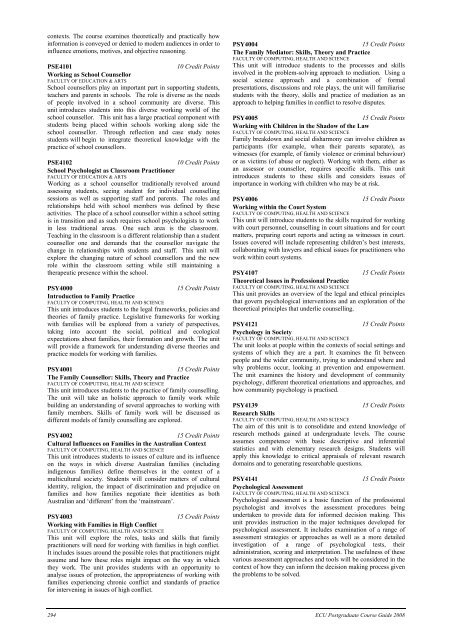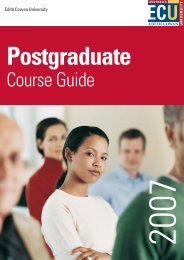Postgraduate - Edith Cowan University
Postgraduate - Edith Cowan University
Postgraduate - Edith Cowan University
You also want an ePaper? Increase the reach of your titles
YUMPU automatically turns print PDFs into web optimized ePapers that Google loves.
contexts. The course examines theoretically and practically how<br />
information is conveyed or denied to modern audiences in order to<br />
influence emotions, motives, and objective reasoning.<br />
PSE4101 10 Credit Points<br />
Working as School Counsellor<br />
FACULTY OF EDUCATION & ARTS<br />
School counsellors play an important part in supporting students,<br />
teachers and parents in schools. The role is diverse as the needs<br />
of people involved in a school community are diverse. This<br />
unit introduces students into this diverse working world of the<br />
school counsellor. This unit has a large practical component with<br />
students being placed within schools working along side the<br />
school counsellor. Through reflection and case study notes<br />
students will begin to integrate theoretical knowledge with the<br />
practice of school counsellors.<br />
PSE4102 10 Credit Points<br />
School Psychologist as Classroom Practitioner<br />
FACULTY OF EDUCATION & ARTS<br />
Working as a school counsellor traditionally revolved around<br />
assessing students, seeing student for individual counselling<br />
sessions as well as supporting staff and parents. The roles and<br />
relationships held with school members was defined by these<br />
activities. The place of a school counsellor within a school setting<br />
is in transition and as such requires school psychologists to work<br />
in less traditional areas. One such area is the classroom.<br />
Teaching in the classroom is a different relationship than a student<br />
counsellor one and demands that the counsellor navigate the<br />
change in relationships with students and staff. This unit will<br />
explore the changing nature of school counsellors and the new<br />
role within the classroom setting while still maintaining a<br />
therapeutic presence within the school.<br />
PSY4000 15 Credit Points<br />
Introduction to Family Practice<br />
FACULTY OF COMPUTING, HEALTH AND SCIENCE<br />
This unit introduces students to the legal frameworks, policies and<br />
theories of family practice. Legislative frameworks for working<br />
with families will be explored from a variety of perspectives,<br />
taking into account the social, political and ecological<br />
expectations about families, their formation and growth. The unit<br />
will provide a framework for understanding diverse theories and<br />
practice models for working with families.<br />
PSY4001 15 Credit Points<br />
The Family Counsellor: Skills, Theory and Practice<br />
FACULTY OF COMPUTING, HEALTH AND SCIENCE<br />
This unit introduces students to the practice of family counselling.<br />
The unit will take an holistic approach to family work while<br />
building an understanding of several approaches to working with<br />
family members. Skills of family work will be discussed as<br />
different models of family counselling are explored.<br />
PSY4002 15 Credit Points<br />
Cultural Influences on Families in the Australian Context<br />
FACULTY OF COMPUTING, HEALTH AND SCIENCE<br />
This unit introduces students to issues of culture and its influence<br />
on the ways in which diverse Australian families (including<br />
indigenous families) define themselves in the context of a<br />
multicultural society. Students will consider matters of cultural<br />
identity, religion, the impact of discrimination and prejudice on<br />
families and how families negotiate their identities as both<br />
Australian and ‘different’ from the ‘mainstream’.<br />
PSY4003 15 Credit Points<br />
Working with Families in High Conflict<br />
FACULTY OF COMPUTING, HEALTH AND SCIENCE<br />
This unit will explore the roles, tasks and skills that family<br />
practitioners will need for working with families in high conflict.<br />
It includes issues around the possible roles that practitioners might<br />
assume and how these roles might impact on the way in which<br />
they work. The unit provides students with an opportunity to<br />
analyse issues of protection, the appropriateness of working with<br />
families experiencing chronic conflict and standards of practice<br />
for intervening in issues of high conflict.<br />
PSY4004 15 Credit Points<br />
The Family Mediator: Skills, Theory and Practice<br />
FACULTY OF COMPUTING, HEALTH AND SCIENCE<br />
This unit will introduce students to the processes and skills<br />
involved in the problem-solving approach to mediation. Using a<br />
social science approach and a combination of formal<br />
presentations, discussions and role plays, the unit will familiarise<br />
students with the theory, skills and practice of mediation as an<br />
approach to helping families in conflict to resolve disputes.<br />
PSY4005 15 Credit Points<br />
Working with Children in the Shadow of the Law<br />
FACULTY OF COMPUTING, HEALTH AND SCIENCE<br />
Family breakdown and social disharmony can involve children as<br />
participants (for example, when their parents separate), as<br />
witnesses (for example, of family violence or criminal behaviour)<br />
or as victims (of abuse or neglect). Working with them, either as<br />
an assessor or counsellor, requires specific skills. This unit<br />
introduces students to these skills and considers issues of<br />
importance in working with children who may be at risk.<br />
PSY4006 15 Credit Points<br />
Working within the Court System<br />
FACULTY OF COMPUTING, HEALTH AND SCIENCE<br />
This unit will introduce students to the skills required for working<br />
with court personnel, counselling in court situations and for court<br />
matters, preparing court reports and acting as witnesses in court.<br />
Issues covered will include representing children’s best interests,<br />
collaborating with lawyers and ethical issues for practitioners who<br />
work within court systems.<br />
PSY4107 15 Credit Points<br />
Theoretical Issues in Professional Practice<br />
FACULTY OF COMPUTING, HEALTH AND SCIENCE<br />
This unit provides an overview of the legal and ethical principles<br />
that govern psychological interventions and an exploration of the<br />
theoretical principles that underlie counselling.<br />
PSY4121 15 Credit Points<br />
Psychology in Society<br />
FACULTY OF COMPUTING, HEALTH AND SCIENCE<br />
The unit looks at people within the contexts of social settings and<br />
systems of which they are a part. It examines the fit between<br />
people and the wider community, trying to understand where and<br />
why problems occur, looking at prevention and empowerment.<br />
The unit examines the history and development of community<br />
psychology, different theoretical orientations and approaches, and<br />
how community psychology is practised.<br />
PSY4139 15 Credit Points<br />
Research Skills<br />
FACULTY OF COMPUTING, HEALTH AND SCIENCE<br />
The aim of this unit is to consolidate and extend knowledge of<br />
research methods gained at undergraduate levels. The course<br />
assumes competence with basic descriptive and inferential<br />
statistics and with elementary research designs. Students will<br />
apply this knowledge to critical appraisals of relevant research<br />
domains and to generating researchable questions.<br />
PSY4141 15 Credit Points<br />
Psychological Assessment<br />
FACULTY OF COMPUTING, HEALTH AND SCIENCE<br />
Psychological assessment is a basic function of the professional<br />
psychologist and involves the assessment procedures being<br />
undertaken to provide data for informed decision making. This<br />
unit provides instruction in the major techniques developed for<br />
psychological assessment. It includes examination of a range of<br />
assessment strategies or approaches as well as a more detailed<br />
investigation of a range of psychological tests, their<br />
administration, scoring and interpretation. The usefulness of these<br />
various assessment approaches and tools will be considered in the<br />
context of how they can inform the decision making process given<br />
the problems to be solved.<br />
294 ECU <strong>Postgraduate</strong> Course Guide 2008



